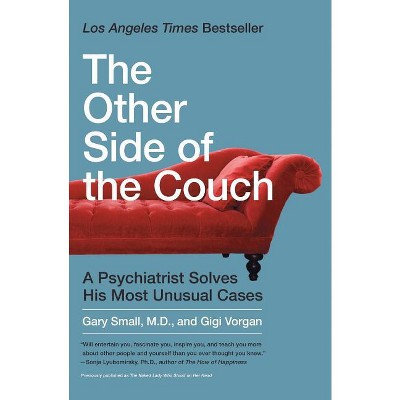Sponsored

Slouch - by Beth Linker
$21.99
Pre-order
Eligible for registries and wish lists
Sponsored
About this item
Highlights
- The strange and surprising history of the so-called epidemic of bad posture in modern America--from eugenics and posture pageants to today's promoters of "paleo posture" In 1995, a scandal erupted when the New York Times revealed that the Smithsonian possessed a century's worth of nude "posture" photos of college students.
- About the Author: Beth Linker is a historian of medicine and disability and a former physical therapist.
- 392 Pages
- Science, History
Description
Book Synopsis
The strange and surprising history of the so-called epidemic of bad posture in modern America--from eugenics and posture pageants to today's promoters of "paleo posture"
In 1995, a scandal erupted when the New York Times revealed that the Smithsonian possessed a century's worth of nude "posture" photos of college students. In this riveting history, Beth Linker tells why these photos were only a small part of the incredible story of twentieth-century America's largely forgotten posture panic--a decades-long episode in which it was widely accepted as scientific fact that Americans were suffering from an epidemic of bad posture, with potentially catastrophic health consequences. Tracing the rise and fall of this socially manufactured epidemic, Slouch also tells how this period continues to feed today's widespread anxieties about posture. In the early twentieth century, the eugenics movement and fears of disability gave slouching a new scientific relevance. Bad posture came to be seen as an individual health threat, an affront to conventional race hierarchies, and a sign of American decline. What followed were massive efforts to measure, track, and prevent slouching and, later, back pain--campaigns that reached schools, workplaces, and beyond, from the creation of the American Posture League to posture pageants. The popularity of posture-enhancing products, such as girdles and lumbar supports, exploded, as did new fitness programs focused on postural muscles, such as Pilates and modern yoga. By 1970, student protests largely brought an end to school posture exams and photos, but many efforts to fight bad posture continued, despite a lack of scientific evidence. A compelling history that mixes seriousness and humor, Slouch is a unique and provocative account of the unexpected origins of our largely unquestioned ideas about bad posture.Review Quotes
"Linker has uncovered a decades-long international panic. . . . [She] expertly conveys just how embedded posture science once was--and how quickly it was forgotten."---Isabel Berwick, Financial Times
"[Slouch] offers insight into how persistent postural ableism harms disabled communities today and why posture continues to captivate modern research and retail. . . . Essential reading for all students and professionals whose work concerns bodies and health inequity."---Rajiv M. Sastry, Disability & Society
"Slouch is a skillfully researched, engrossing account of a socially engineered epidemic that captured the public imagination for the better part of a century."-- "Shelf Awareness "
"A long history of anxiety about the proximity between human and bestial nature. . . . Linker traces the history of this concern: from the exchanges of nineteenth-century scientists, who first identified the possible ancestral causes of contemporary back pain, to the late-twentieth-century popularity of the Alexander Technique, Pilates, and hatha yoga. . . . She sees the 'past and present worries concerning posture' . . . [are] grounded in a mythology of human ancestry that posits the hunter-gatherer as an ideal from which we have fallen."---Rebecca Mead, The New Yorker
"A useful addition to the larger scholarship on the social, cultural, and political implications of bodily standards. . . . [Slouch] reveals the normalization and standardization of bodily comportment that was central to the posture sciences from its origins to the present and interrogates the ableism and racism at its core."---Jennifer Kaufmann-Buhler, Technology & Culture
"A Behavioral Scientist Notable Book of the Year"
"A Choice Outstanding Academic Title of the Year"
"An engaging book on the science of posture. . . . [Linker] provides a sophisticated critique of identifying postural problems as an 'epidemic, ' which engages modes of surveillance and control, often internalized by each generation. . . . Highly recommended."-- "Choice Reviews"
"Astonishing."---Daniel Felsenthal, New Republic
"Compelling. . . . [a] fascinating study."---Anna Katharina Schaffner, Times Literary Supplement
"Deeply researched and engagingly written. . . . This book is a must-read for scholars in the history of nineteenth and twentieth-century science, medicine, and disability."---Andrew J. Hogan, Journal of the History of Medicine and Allied Sciences
"Fascinating."---Tim Horder, Oxford Magazine
"Well-researched."---Belinda Lanks, Wall Street Journal
About the Author
Beth Linker is a historian of medicine and disability and a former physical therapist. She is the Samuel H. Preston Endowed Term Professor in the Social Sciences in the Department of History and Sociology of Science at the University of Pennsylvania. She is the author of War's Waste: Rehabilitation in World War I America, and her work has been featured in The New Yorker, the Boston Globe, and other publications.Dimensions (Overall): 8.0 Inches (H) x 5.25 Inches (W) x .97 Inches (D)
Weight: .81 Pounds
Suggested Age: 22 Years and Up
Number of Pages: 392
Genre: Science
Sub-Genre: History
Publisher: Princeton University Press
Format: Paperback
Author: Beth Linker
Language: English
Street Date: March 24, 2026
TCIN: 1005998699
UPC: 9780691235516
Item Number (DPCI): 247-20-0474
Origin: Made in the USA or Imported
If the item details aren’t accurate or complete, we want to know about it.
Shipping details
Estimated ship dimensions: 0.97 inches length x 5.25 inches width x 8 inches height
Estimated ship weight: 0.81 pounds
We regret that this item cannot be shipped to PO Boxes.
This item cannot be shipped to the following locations: American Samoa (see also separate entry under AS), Guam (see also separate entry under GU), Northern Mariana Islands, Puerto Rico (see also separate entry under PR), United States Minor Outlying Islands, Virgin Islands, U.S., APO/FPO
Return details
This item can be returned to any Target store or Target.com.
This item must be returned within 90 days of the date it was purchased in store, shipped, delivered by a Shipt shopper, or made ready for pickup.
See the return policy for complete information.
Frequently bought together
Trending Non-Fiction


$18.28
was $19.58 New lower price
4.7 out of 5 stars with 17 ratings
















